Baby Spitting up Clear Liquid | Reasons & Remedies
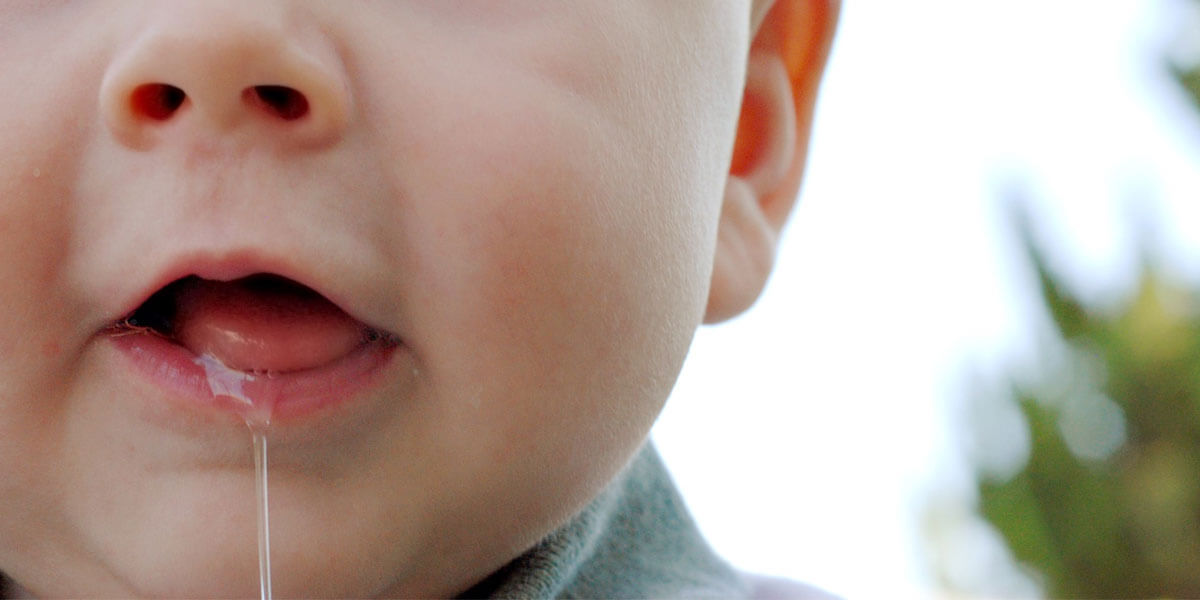
As a new parent, the possibility of even the most minor issues happening with your baby may be enough to send chills up your spine. Many parents, for these express reasons, prefer to be safe than sorry and frequently hunt down internet forums in case of the slightest anomaly. One such occurrence is when your baby begins to spit up clear liquid and you’re not really sure why.
This experience is very rare with babies – however, if your child is experiencing this and is spitting up clear liquid frequently, then it’s most likely not a cause for worry yet. However, if unchecked, it may lead to deeper issues such as weight and digestive problems, so exercise caution – understand why your baby is doing so and take the necessary steps to fix it.
Why is My Baby Spitting up Clear Liquid?
We understand that it may be a daunting experience to watch your baby throw up clear liquid. If you’re here, then you most likely want to understand why this phenomenon happens and if it has any far-reaching consequences.
While most of the reasons for babies throwing up clear liquid are harmless, you might want to check and reassure yourself. Here are some common reasons why babies throw up clear liquid and if it’s something you should look further into.
1. Spit-up
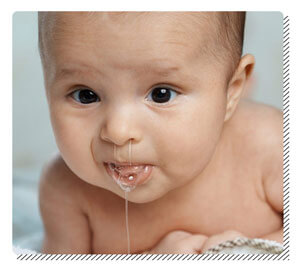
The most common reason why your baby may be spitting up clear liquid is because of this phenomenon known as spit-up. This phenomenon is most observed when your baby is under the age of one. You may or may not have noticed this before, but it typically occurs after you’ve finished feeding your baby.
Your baby will burp, indicating that they’re about to proceed with spitting up, and you should ready yourself with a cloth to wipe it away. Don’t worry, it’s completely normal for this to happen to babies – even though it may seem like they’re spitting out large amounts of liquid accompanied with other stomach contents, or it can be clear liquid as well.
2. Overfeeding
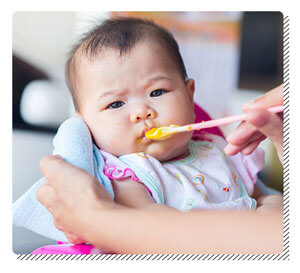
Another reason that is closely related to spitting up is that you’re perhaps overfeeding your baby. While you would most likely find it incredibly difficult to tear your baby away from their source of feeding, it is quite necessary to do so. Babies, unlike adults, do not know when to stop consumption unless it’s making them uncomfortable.
However, if you do begin to overfeed your baby often, you will notice that their usual spitting up has transformed into them vomiting instead. If this happens infrequently, then there’s absolutely no cause for worry – just attempt to change the feeding duration a bit.
If this happens often, however, you may need to pay immediate attention to your baby’s consumption as this may lead to more problems in the future.
3. Improper Latch

While breastfeeding your baby, it is quite natural that they may latch on improperly. It would be in your best interest to correct the latching for your baby, since the opposite may cause them to not be able to get the desired amount of milk.
Additionally, improper latching can also mean the baby inhales huge amounts of air while feeding, which can lead to several digestive complications. It would do you well to correct the latching since improper latching can lead to painful feeding sessions for you as well.
4. Teething
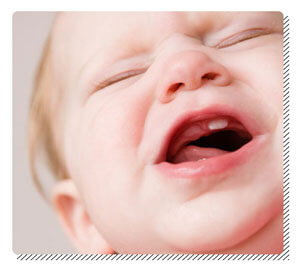
As a new parent, you probably know all about the difficult period of your baby’s development in which they’re teething. During this period, they’re likely in a lot of pain from the stress of growing completely new teeth.
These pains can induce them to salivate in extreme amounts – all you will need to do here is keep a piece of cloth handy and offer them a teething ring to appease their sore gums. On the bright side, this is a completely normal process and occurs to every baby – so while it may be difficult while it’s happening you can be reassured that it will end soon.
5. GERD

GERD, or Gastroesophageal Reflux Disease, is one of the more serious reasons why your baby may be spitting up clear liquid. It is slightly different from the usual reflux and is a sign of digestive anomalies – but don’t worry, almost all babies with GERD are largely unaffected by it.
Reflux transforms into GERD/acid reflux when the food pipe is potentially damaged by the acid present in the reflux. A very small amount of babies can have long-lasting effects of GERD such as muscle problems or nervous problems.
Recommended: Best Anti Colic Bottles in UK
6. Pyloric Stenosis

This is an extremely rare condition, so it is quite possible that this is not the cause for your baby spitting up clear fluid. However, the most telling symptom of this condition is the frequent projectile vomit that is usually a warning sign. This condition causes the pylorus to become enlarged and potentially block the food from making its way to the small intestine – resulting in the baby throwing up frequently.
Naturally, it follows that your baby must always feel hungry since their hunger is never sated properly, and maybe losing weight as well. This condition can be fixed by surgery, so it is best to contact your doctor if you’re observing similar symptoms.
Spit up Vs GERD or Acid Reflux
While both of these can seem similar on the surface, it is extremely crucial to tell the difference between both of them in order to figure out if your baby’s spitting up is a more serious issue.
| GERD/Acid Reflux | Usual spit-up |
|---|---|
| May result in loss of ability to gain weight | Weight gain ability is normal |
| Dissatisfied and greatly uncomfortable after feeding, and also refuses to be put on their back. Bowel movement is affected: it will be foamy and gassy | Satisfied after feeding; no discomfort |
| Respiratory issues such as choking, wheezing, coughing Baby may experience frequent pneumonia and apnea | No such respiratory issues |
| Your baby may refuse to be fed or may demand to be fed for longer. Hiccups and sourness in breath | Feeding time is the same as usual |
| Tilting of the neck | Neurobehavioural development is normal |
| Frequent and projectile vomit | Baby ejects spit-up only |
How to Prevent Babies from Throwing up Clear Liquid
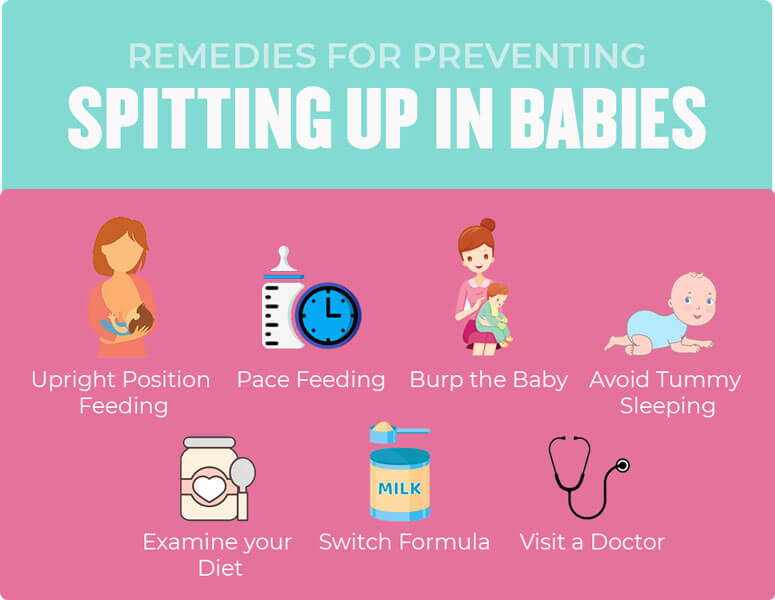
If you’re worried that your baby may be throwing up clear liquid because of the aforementioned reasons, then you may want to try some of the methods below that help in the digestive process massively. They will also put your baby at ease and may reduce the frequency of spitting up.
1. Feed in an Upright Position
While this seems absurdly simple, it can actually prove to work wonders against any digestive issues that your baby might be facing. Allowing them to set the pace for their feeding session and not having to consume more than they can handle is something that this position makes possible.
It has them taking their time with the feeding as well – which, as we’ll see, is something that’s also important for preventing them from spitting up. After you feed your baby in this position, hold them like that for a little while more. This allows the liquid to settle well in your baby’s digestive system and discourages throwing up.
2. Burp the Baby
Encouraging your baby to burp during and after feedings may make a huge difference and prevent the possibility of reflux as well. This method is also something that can be tried when you notice that your baby is not as enthusiastic about their feeding sessions as usual – maybe they’re just gassy!
Burping the baby encourages this gas to escape their digestive tracts, and puts their body at ease and relaxation once again. This reduces the frequency of spit-ups exponentially as well. There are several positions you need to keep in mind while making your baby burp – it is crucial to select the right posture to teach them how to burp properly!
3. Pace Feeding
This is the most direct solution against overfeeding your baby. Plan out routines for feeding your baby and stick to them religiously. This not only encourages you to maintain a mental note of your baby’s appetite but also helps them to internalize this schedule as well.
After you’ve indulged in pacing your feeding sessions for a while, your baby will come to expect their meals at those specific times only – and not outside of them. This helps you gauge exactly how much you should be feeding your baby and when so as to reduce the possibility of them throwing up or spitting up.
4. Avoid Baby to Rest on their Stomach
Since babies are unable to reposition themselves while sleeping, it is important to check up on them extremely frequently. This is especially true after they’ve been fed, since lying on their stomachs can constrict their digestive tract and have them choke up on the food they just ate. This messes up with the digestive process and, in extremely rare cases, may even lead to Sudden Infant Death Syndrome or SIDS.
The best way to ensure that this does not happen is to have them lying on their sides instead – and frequent check-ins will help you stay reassured against untoward accidents as well. If your baby is resting on their back or sides, their digestion is not blocked in any way and this reduces the risk of them throwing up all over themselves as well.
Recommended: Grunting Baby Syndrome – Why is your Baby Grunting?
5. Examine your Diet
While you may be taking extreme care of your baby’s diet and the schedule for the same, you may possibly have ignored your own diet as well. If you’re breastfeeding your baby, then it naturally makes sense that any nutrients or substances that you consume will be transferred to your baby as well.
This includes certain medications, substances that may be allergic to your baby, and other substances that are not good for their digestion overall. For the period of breastfeeding, avoid any such substances that you think maybe leading to your baby spitting or throwing up after feeding.
6. Switch Formula
Baby formula can often be a hit or miss with babies with sensitive stomachs or who have sensitive stomachs or have digestive issues more often than not. Most baby formula contains cow milk – which can be a little difficult for babies to digest with ease.
Pick a baby formula that includes ingredients that are slightly easier for your baby to digest. These can range anywhere from soy milk to other alternatives that are exponentially easier for digestion if your baby has a sensitive stomach.
Also read: Best Baby Bottle Makers in UK
7. Visit a Doctor
If you feel like you’ve already double-checked through most of the problems on this list and your baby is still frequently spitting up in unusual amounts, then perhaps it’s time to go to the doctor. If their spit-up liquids are of different colors and are tinted pink, red, or green, then it may be the symptoms of a deeper underlying problem.
Additionally, if your baby is spitting up well past their first birthday, then this may also indicate that your baby could potentially develop GERD, pyloric stenosis, or any other issue that might require immediate medical attention. To reassure yourself, you can take preventative measures by taking yourself and your baby to the doctor as well.
Our Advice
As you might have noticed, there might be non-worrisome symptoms of your babies spitting up mucus. Not all these reasons lead to more serious problems, so you can rest assured and accept the fact that your baby will continue to spit up in their first year. However, if it starts happening extremely frequently and leads to discomfort in your baby, then you might have a bigger problem on your hands.
Don’t panic – these issues can be fixed with medical assistance and are not fatal in the least. All that would be needed is for you to be observant and notice the properties of spit-up when it occurs to your baby.

Laura is a trained primary teacher who takes a profound liking in interacting with and bringing out the best in children. She is also an ISSA certified pediatrician with an extensive practice of over 12 years. Laura comprehends the needs of infants and now compresses her expertise into writing thorough parenting guides to aid new parents.





